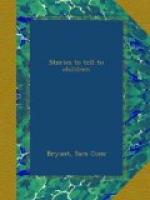The story of “The Little Jackal and the Alligator” is a good illustration of this type. It is a character-story. In the naive form of a folk tale, it doubtless embodies the observations of a seeing eye, in a country and time when the little jackal and the great alligator were even more vivid images of certain human characters than they now are. Again and again, surely, the author or authors of the tales must have seen the weak, small, clever being triumph over the bulky, well-accoutred, stupid adversary. Again and again they had laughed at the discomfiture of the latter, perhaps rejoicing in it the more because it removed fear from their own houses. And probably never had they concerned themselves particularly with the basic ethics of the struggle. It was simply one of the things they saw. It was life. So they made a picture of it.
The folk tale so made, and of such character, comes to the child somewhat as an unprejudiced newspaper account of to-day’s happenings comes to us. It pleads no cause, except through its contents; it exercises no intentioned influence on our moral judgment; it is there, as life is there, to be seen and judged. And only through such seeing and judging can the individual perception attain to anything of power or originality. Just as a certain amount of received ideas is necessary to sane development, so is a definite opportunity for first-hand judgments essential to power.
In this epoch of well-trained minds we run some risk of an inundation of accepted ethics. The mind which can make independent judgments, can look at new facts with fresh vision, and reach conclusions with simplicity, is the perennial power in the world. And this is the mind we are not noticeably successful in developing, in our system of schooling. Let us at least have its needs before our consciousness, in our attempts to supplement the regular studies of school by such side-activities as story-telling. Let us give the children a fair proportion of stories which stimulate independent moral and practical decisions.
And now for a brief return to our little black friend. “Epaminondas” belongs to a very large, very ancient type of funny story: the tale in which the jest depends wholly on an abnormal degree of stupidity on the part of the hero. Every race which produces stories seems to have found this theme a natural outlet for its childlike laughter. The stupidity of Lazy Jack, of Big Claus, of the Good Man, of Clever Alice, all have their counterparts in the folly of the small Epaminondas.
Evidently, such stories have served a purpose in the education of the race. While the exaggeration of familiar attributes easily awakens mirth in a simple mind, it does more: it teaches practical lessons of wisdom and discretion. And possibly the lesson was the original cause of the story.




